François-Xavier FelpinProfessor, University of Nantes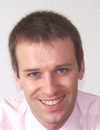 François-Xavier Felpin was born in France. After earning his Ph.D. at the University of Nantes (France) in 2003, he pursued postdoctoral studies at The Ohio State University (USA). In 2004 he joined the University of Bordeaux as an Assistant Professor and he received his habilitation in 2009. In fall 2011 he moved to the University of Nantes where he was promoted full Professor. Prof. Felpin was a junior member of the Institut Universitaire de France (2012-2017). His research interests include catalysis, material chemistry and automated flow chemistry. |
C. Oliver KappeProfessor and Scientific Director, Center for Continuous Flow Synthesis and Processing, University of Graz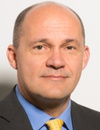 C. Oliver Kappe is Professor of Chemistry at the University of Graz (Austria) and Scientific Director of the Center for Continuous Flow Synthesis and Processing (CC FLOW) at the Research Center Pharmaceutical Engineering GmbH (RCPE). He received his diploma (1989) and his doctoral (1992) degrees in organic chemistry from the University of Graz where he worked with Gert Kollenz on cycloaddition and rearrangement reactions of acylketenes. After periods of postdoctoral research work on reactive intermediates and matrix isolation spectroscopy with Curt Wentrup at the University of Queensland in Brisbane, Australia (1993-1994) and on synthetic methodology/alkaloid synthesis with Albert Padwa at Emory University in Atlanta, USA (1994-1996), he moved back to the University of Graz in 1996 to start his independent academic career. He obtained his „Habilitation“ in 1998 in organic chemistry and was appointed Associate Professor in 2000. Since 2011 he is Professor for „Technology of Organic Synthesis“ (Organische Synthesetechnologie) at the Institute of Chemistry at the University of Graz. He has spent time as visiting scientist/professor at e.g. the Scripps Research Institute (La Jolla, USA, K. Barry Sharpless, 2003), the Toyko Institute of Technology (Toyko, Japan, T. Takahashi, 2008), the Sanford-Burnham Institute for Medical Research (Orlando, USA, 2010) and the Federal University of Rio de Janeiro (Rio de Janeiro, Brazil, 2013-2015). |
Simon KuhnProfessor, Department of Chemical Engineering, KU Leuven Belgium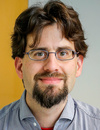 Simon Kuhn received his Diploma in Chemical Engineering from TU Munich and his PhD from ETH Zurich. After a stay as post-doctoral fellow at the Massachusetts Institute of Technology (MIT), he joined the Department of Chemical Engineering at University College London as assistant professor. In 2014, he was appointed as professor in the Department of Chemical Engineering at KU Leuven. His research interests lie in the characterization of transport processes in complex flows using experiments and modeling, scaling-up microchemical systems, and design of novel flow reactors. |
Anita MaguireProfessor of Pharmaceutical Chemistry, University College Cork Anita is a graduate of UCC (BSc 1985, PhD 1989). Following postdoctoral research in Namur, Belgium then in Exeter, UK, Anita returned to UCC in 1991 to establish a research team in synthetic organic chemistry and has played a strategic role at the interface with the pharmaceutical industry. She is a Co-PI in the national SFI Centre SSPC. She was elected as a Member of the Royal Irish Academy in 2014 and appointed RIA Vice President in 2019. She was an Adjunct Professor in the University of Bergen, 2011-16. She was VP Research & Innovation in UCC 2011-21. Throughout her career she has been actively engaged nationally in strategic R&I policy development including as a member of the Advisory Science Council. Since 2015 she is the inaugural Chair of the National Forum on Research Integrity, leading national policy development and implementation in this area. |
Jean-Christophe MonbaliuProfessor of Organic Chemistry, Center for Integrated Technology and Organic Synthesis (CiTOS), University of Liège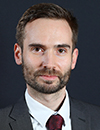 Jean-Christophe M. Monbaliu, born in Brussels, Belgium, studied chemistry at the Université catholique de Louvain, Belgium, where he received his Ph.D. in Organic Chemistry. In 2008, he started a postdoc at the Faculty of Bioscience Engineering of the Ghent University, Belgium, where he was later appointed as a postdoctoral associate of the Research Foundation-Flanders. In 2010, he was awarded a Belgian American Educational Foundation fellowship that triggered his relocation to the USA. He joined the Center for Heterocyclic Compounds at the University of Florida, Gainesville, USA. In 2012, he was appointed at the Massachusetts Institute of Technology (MIT), Cambridge, MA, USA. In 2013, he came back to Belgium and settled at the University of Liège. Monbaliu created the Center for Integrated Technology and Organic Synthesis (CiTOS), where he is currently developing new methods for organic synthesis using micro- and mesofluidic reactors. CiTOS is the first European Corning® Advanced-Flow™ reactor (AFR) qualified lab. |
Anna SlaterProfessor of Chemistry and Royal Society University Research Fellow, University of Liverpool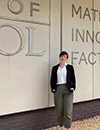 Prof Anna Slater received her PhD in supramolecular chemistry from the University of Nottingham in 2011. Following postdoctoral positions in porphyrin self-assembly and porous organic cage materials she took up a Royal Society-EPSRC Dorothy Hodgkin Fellowship in 2016 and a Royal Society University Research Fellowship in 2021, both at the University of Liverpool. She was promoted to Chair of Chemistry in 2022. Anna developed an interest in flow chemistry during her PDRA positions, recognizing that flow technology has a lot to offer the supramolecular chemist; exploiting flow processes for enhanced control of chemistry is now a central theme of her work. Her research interests include molecular materials, enabling technology and organic synthesis and self-assembly. |
Thomas WirthProfessor, Cardiff University Thomas Wirth is professor of organic chemistry at Cardiff University. After studying chemistry in Bonn, he obtained his PhD and at the Technical University of Berlin. After a postdoctoral stay at Kyoto University, he started his independent research at the University of Basel before taking up his current position at Cardiff University in 2000. He was invited as a visiting professor to several places. Thomas Wirth was awarded the Werner-Prize from the New Swiss Chemical Society, the Furusato award from JSPS London, the Wolfson Research Merit Award from the Royal Society and the Bader Award from the Royal Society of Chemistry. In 2016 he was elected as a fellow of The Learned Society of Wales. His main interests of research concern stereoselective electrophilic reactions, oxidative transformations with hypervalent iodine reagents including mechanistic investigations and organic synthesis performed in microreactors. |




